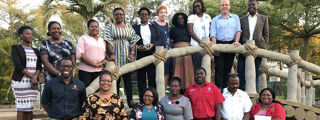BCU has supported national development of nursing education programmes in Zambia, which have led to a more knowledgeable healthcare service, improved patient outcomes and helped nursing staff to better respond to the Covid-19 pandemic.
Research summary
Chris Carter and Professor Joy Notter’s seven-year collaboration with the Ministry of Health in Zambia has supported the national development of critical care nurse education to degree level, increasing the country’s specialist nurse provision.
This partnership adapted throughout the coronavirus pandemic to deliver several projects.
This produced numerous outcomes, such as increased training provision for nurses in Zambia aimed at improving the pandemic response and the development of a short and long-term model for managing future outbreaks.
Research background
At the start of the project in 2015, critical care education was severely overlooked, with only one critical care nursing programme and a single tutor to serve the entire country. This led to a limited number of nurses trained in dealing with severe injury or those suffering from life-threatening diseases.
Chris and Joy’s initial work with the Zambian Ministry of Health and Lusaka College of Nursing was part of a Global Challenges Research Fund (GCRF) project to evaluate the healthcare landscape in Zambia.
The national review of 19 hospitals provided the Ministry with a clear picture of how their healthcare systems were being used and provided urgently needed government data to address identified service gaps.
Following the national review, Chris and Joy worked directly with the Ministry and education providers in Lusaka College to devise a policy and project roadmap aimed at increasing critical care nursing programmes across the country.
Zambia’s Healthcare Response to Covid-19
Zambia recorded its first case of Covid-19 in March 2020 and has suffered an increase in cases in line with other countries across the world. Critical care and trauma nurses are crucial to an effective pandemic response, and nurses with specialist training have been particularly overstretched throughout the pandemic.
The BCU team worked with UK and Zambian partners to commence projects that would meet the emerging needs of healthcare services during the pandemic. These projects included developing a context-specific Covid-19 training package for healthcare workers at the Lusaka College of Nursing and Midwifery and the University Teaching Hospitals.
With support from the Tropical Health Education Trust, this package has helped train 60 nurse educators and over 970 students in topics such as hand hygiene training, myth-busting and infection prevention and control.
Outcomes and impact
As a result of the collaboration, the healthcare agenda in Zambia has progressed to reduce service gaps and increase nursing education programmes, especially in the field of critical and trauma care.
In contrast to the nursing education landscape in 2015, there are now two colleges of nursing and seven critical care tutors serving the country. Critical care education in Zambia has now progressed to a Bachelor’s level course, offering new opportunities in learning and teaching.
Since 2015, the BCU team have delivered impact in several projects aligned to Zambia’s goals to improve the quality of nursing. Some of these impacts include:
- Providing policy recommendations for increasing the use of simulation and skills laboratories to train nursing students
- Developing a mentorship and assessment programme for critical care nurses in Zambia
In response to the pandemic, Carter and Professor Notter’s work has encouraged wide adoption of context-specific Covid-19 training, which has resulted in greater clarity for nurses and educators around the pandemic response.
The partnership is currently working on a UKRI/GCRF Newton Fund project, which aims to address the effects of diverting resources from other areas of healthcare to tackle Covid-19. The project will also aim to provide short and long-term solutions to dealing with future outbreaks.
Concerning the Newton Fund project, Chris Carter said:
